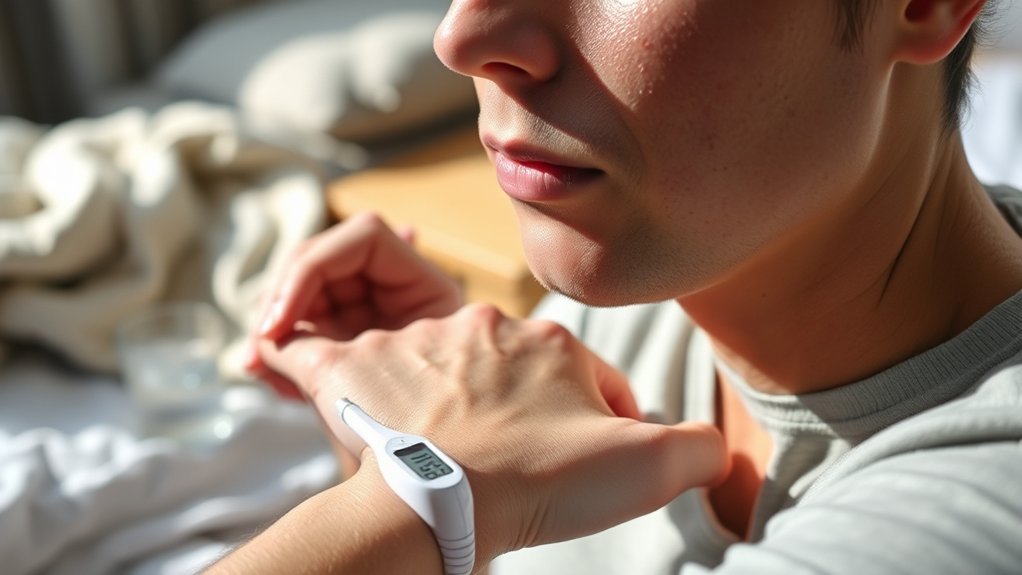Have you ever noticed how a room’s temperature can shift your mood in an instant? When it’s too hot or too cold, you might feel distracted, fatigued, or even a bit unwell. Understanding the symptoms linked to uncomfortable temperatures is essential for maintaining your well-being. As we explore these signs, you’ll discover simple adjustments that can enhance your comfort and productivity in everyday life.
How Temperature Affects Your Mood
When the temperature rises or falls, it can considerably influence your mood. Temperature fluctuations often trigger various emotional responses, altering how you feel throughout the day.
Temperature changes can significantly affect your emotions, shifting your mood throughout the day.
For instance, warmer days usually lift spirits, making you feel energized and sociable, while colder temperatures can lead to feelings of lethargy or even sadness. This isn’t just coincidence; research shows that climate impacts neurotransmitter levels, which are essential for regulating mood.
You might find yourself craving sunshine during winter months, seeking that boost of happiness it brings. By becoming aware of these patterns, you can take proactive steps to manage your environment, creating a space that nurtures your emotional well-being.
Embrace this knowledge and liberate yourself from the mood swings linked to temperature changes!
Physical Symptoms of Extreme Temperatures
Extreme temperatures can cause a range of physical symptoms that affect your body’s ability to function properly.
In extreme heat, you might experience heat exhaustion, which includes heavy sweating, weakness, dizziness, and nausea. Your body struggles to cool itself, leading to potential heat-related illnesses.
On the flip side, exposure to cold can trigger cold shock, causing rapid breathing, increased heart rate, and disorientation. This response can be alarming and may impair your decision-making.
It’s essential to recognize these symptoms and respond promptly. Stay hydrated and seek shade in the heat; dress warmly and stay dry in the cold.
Awareness of these physical symptoms empowers you to protect yourself, ensuring your body remains in peak condition regardless of temperature extremes.
The Connection Between Room Temperature and Sleep Quality
While many factors influence sleep quality, room temperature plays a crucial role in helping you achieve a restful night’s sleep. Your body relies on temperature regulation to navigate through various sleep cycles.
Ideally, a cooler environment—around 60 to 67 degrees Fahrenheit—can enhance your chances of falling asleep faster and staying in deeper sleep stages. When it’s too hot or too cold, you may experience disruptions that prevent you from enjoying restorative sleep.
A stable temperature helps signal to your body that it’s time to wind down, promoting relaxation. By fine-tuning your room temperature, you can liberate yourself from restless nights and awaken refreshed, ready to seize the day.
Prioritize this simple yet powerful adjustment for improved sleep quality.
Managing Temperature for Better Focus and Productivity
Although you mightn’t realize it, the temperature of your workspace can greatly impact your focus and productivity. Effective temperature regulation is essential for creating an environment where you can thrive.
A workspace that’s too hot or cold can distract you, leading to decreased motivation and creativity. Aim for a comfortable range, typically between 68°F and 72°F, to optimize your performance.
Adjusting your thermostat isn’t the only solution; consider using fans or space heaters for quick fixes. Natural ventilation can also work wonders.
Tips for Maintaining an Ideal Living Environment
Creating an ideal living environment isn’t just about aesthetics; it’s essential for your well-being and comfort. To achieve this, focus on humidity control and air circulation. Here are some tips to help you maintain a harmonious space:
| Aspect | Tips | Benefits |
|---|---|---|
| Humidity Control | Use a dehumidifier | Reduces mold and allergens |
| Air Circulation | Open windows regularly | Improves air quality |
| Temperature | Set thermostat to 68°F | Enhances comfort |
| Décor | Incorporate plants | Boosts mood and purifies air |
Frequently Asked Questions
What Is the Ideal Room Temperature for Optimal Health?
The ideal room temperature for peak health is generally between 68 and 72 degrees Fahrenheit. Staying within this range can enhance comfort, improve sleep quality, and boost overall health benefits, keeping you feeling your best.
Can Room Temperature Affect Children’s Behavior?
Room temperature can be a silent puppeteer, tugging at your child’s mood. When it’s too hot or cold, you’ll notice temperament changes and mood swings, impacting their behavior and overall well-being. Keep it comfortable!
How Does Humidity Impact Room Temperature Perception?
Humidity levels greatly affect how you perceive room temperature. High humidity can make a space feel warmer, reducing your thermal comfort, while low humidity can create a cooler sensation, enhancing your overall comfort experience.
Does Room Temperature Influence Appetite or Digestion?
Studies show that warmer temperatures can increase your metabolic rate by up to 10%. This change affects hunger cues and digestion, making you more likely to feel hungry and digest food efficiently in a comfortable environment.
What Are the Long-Term Effects of Living in Extreme Temperatures?
Living in extreme temperatures can lead to heat exposure, causing dehydration and heatstroke, or cold stress, which results in hypothermia and frostbite. Both can seriously impact your health and overall well-being over time.
Conclusion
In a world where the perfect room temperature reigns supreme, you’re not just comfortable—you’re a productivity powerhouse! Imagine breezing through tasks with laser-like focus, while sleep envelops you like a cozy cloud. Neglecting temperature, though, could send you spiraling into a dizzying haze of fatigue and irritability. By mastering your environment, you’re not just adjusting a thermostat; you’re revealing the secret to a happier, healthier you. So go on, tweak that dial and watch your life transform!
